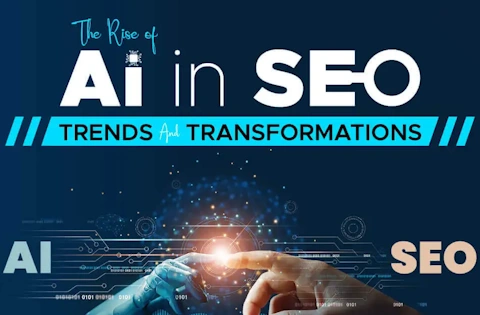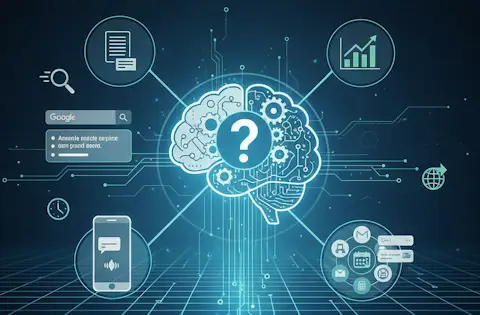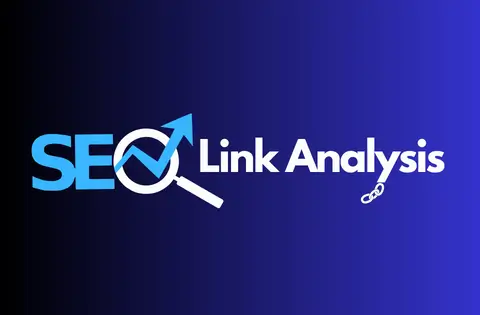The Rise of AI in SEO: Trends and Transformations

Search engine optimization (SEO) and artificial intelligence (AI) integration are becoming essential components of successful online enterprises in the ever-changing digital market. The combination of artificial intelligence (AI) and the quickening pace of technological innovation is transforming the SEO services of the future.
The rise of AI in SEO could refer to several things such as Content Creation and Optimization, Automated Content Generation, Chatbots and Virtual Assistants, Predictive Analytics, Ranking and SERP Analysis, Image and Video Recognition, Personalization and User Experience, and Algorithmic Changes and Updates.
AI increases SEO effectiveness by predicting metrics, automating activities, and providing insightful data. Companies can use it better to evaluate search trends, spot user behavior patterns, and decide how to improve their websites for improved user experiences and higher organic search engine rankings. In this post, we’ll look at the critical implications of AI on SEO and the chances it gives businesses to employ professional SEO services to reach previously unheard-of growth.
The Historical Perspective
a) Evolution of SEO Practices
Since it first began, SEO has experienced substantial changes. SEO was once primarily concerned with link building and keyword optimization, but it has now expanded to include user experience, relevant content, and content quality.
b) Emergence of AI in SEO
The integration of AI into SEO gained momentum in the early 21st century. Search engines like Google began incorporating machine learning algorithms to deliver more accurate and relevant search results. This marked a shift from rule-based algorithms to systems capable of learning and adapting over time.
c) Milestones and Key Developments in the Integration of AI and SEO
Significant developments that have shaped the incorporation of AI in SEO include Google’s Rank Brain, a machine learning search algorithm. The sector has transformed due to search engine algorithms’ capacity to comprehend context, assess user queries, and provide tailored results.
Current Landscape of AI in SEO
a) Role of AI in Search Engine Algorithms
Google’s Algorithms for Ranking Utilizing AI: Google, the top search engine, has integrated AI into its ranking algorithms. Rank Brain is a search engine that was developed in 2015. It uses machine learning to comprehend the context of search queries and provide more relevant and accurate results. Because of this, semantic search is much more important than keyword matching.
Impact on User Experience and Search Results: User experience is given top priority by AI-driven algorithms, which consider website usability, mobile friendliness, and page load speed. This builds a mutually beneficial link between AI and SEO by improving user satisfaction and helping to rank higher on search engines.
b) Applications of AI in On-Page SEO
Content Optimization: Artificial intelligence (AI) systems evaluate past data, user behavior, and preferences to optimize content for engagement and relevancy. Improved search engine visibility results from algorithms’ ability to comprehend and interpret content context thanks to natural language processing (NLP).
Researching and Targeting Keywords: The process of conducting keyword research is made easier by AI-powered tools that identify patterns, assess user intent, and suggest relevant terms. This helps businesses to modify their content according to the shifting tastes of their target audience.
c) Off-Page SEO and Link-Building with AI
Natural Language Processing for Link Analysis: AI’s ability to comprehend natural language aids in more sophisticated link analysis. Search engines can assess the context and relevance of links, distinguishing between high-quality, organic links and potentially spammy ones.
AI-Driven Outreach Strategies: AI-powered automated outreach techniques streamline the process of creating backlinks. Artificial intelligence (AI) solutions can do mass-tailored outreach campaigns, evaluate competitor link profiles, and spot possible link-building opportunities.
How AI Is Transforming SEO
Integrating Artificial Intelligence (AI) into Search Engine Optimization (SEO) marks a significant paradigm shift in how digital marketing strategies are formulated and executed. This multifaceted transformation impacts various aspects of SEO, from content optimization to user experience. Below, we explore in detail how AI is reshaping the landscape of SEO.
a) Content Optimization:
AI has revolutionized content optimization by bringing a more nuanced understanding of user intent and relevance. Traditional SEO practices often relied on keyword density and placement, but AI-driven algorithms, such as Google’s Rank Brain, go beyond simple keyword matching. These algorithms employ machine learning to understand the context and semantics of content. As a result, search engines can better interpret the meaning behind user queries and deliver more accurate and contextually relevant search results.
Natural Language Processing (NLP) is a critical component of AI that plays a pivotal role in content optimization. NLP algorithms analyze the structure and meaning of language, enabling search engines to comprehend content as humans do. This has led to a shift from rigid keyword optimization to a more natural and conversational approach, aligning with the changing patterns of user search behavior.
b) User Experience Enhancement:
AI greatly enhances website user experience, which is essential for SEO rankings. When ranking websites, search engines—most notably Google—consider factors including page load speed, mobile friendliness, and general usability. Through user behavior information, AI algorithms aid in optimizing these factors.
For example, machine learning algorithms look for patterns and preferences in user interaction data. Afterward, using this data to tailor user experiences, the content more likely to interest and satisfy certain users is shown. Businesses can indirectly improve their SEO rankings by improving customer satisfaction, as search engines prefer websites that offer a satisfying user experience.
c) AI in SEO Automation Processes
AI-driven automation has streamlined various SEO processes, saving time and resources for businesses. One notable application is automating routine tasks like keyword research, content creation, and link-building strategies. AI tools can analyze vast amounts of data, identify trends, and generate insights at a speed and scale impossible for manual processes.
Automated content creation, facilitated by Natural Language Generation (NLG) algorithms, allows marketers to generate high-quality, relevant content more efficiently. This addresses the constant demand for fresh content and frees up human resources to focus on more strategic aspects of SEO, such as planning and analysis.
d) Predictive Analytics for SEO Planning
AI’s ability to analyze historical data and predict future trends is instrumental in shaping effective SEO strategies. Predictive analytics powered by machine learning algorithms forecast changes in user behavior, algorithm updates, and industry trends. This foresight enables businesses to proactively adjust their SEO strategies, staying ahead of the curve.
For instance, AI can predict seasonal trends, allowing businesses to optimize their content and marketing strategies during peak times. By understanding when and how user behavior is likely to change, SEO professionals can allocate resources more effectively and maximize the impact of their campaigns.
e) Personalization of Search Results
Personalization powered by AI is revolutionizing the search industry. Conventional SEO methods employed a one-size-fits-all approach, treating every user similarly. On the other hand, AI makes it possible to tailor search results according to user preferences, search history, and activity.
Search results are more relevant for each user when personalized to this extent, making the search process more effective and pleasant. Businesses can customize their content to match specific user preferences as search engines get better at interpreting user intent, which will increase conversion rates and customer happiness.
Trends Shaping the Future of AI in SEO
a) Voice Search and Conversational AI
Optimization for Voice-Activated Devices: The significance of content search engine optimization has increased due to the growing usage of voice-activated devices such as virtual assistants and smart speakers. AI significantly impacts how businesses handle search engine optimization trends since it is necessary to understand and respond to conversational queries. Businesses need to stay current with search engine optimization developments as more and more people use voice search for information. They will be able to optimize their content and improve their internet visibility as a result.
Changes in Search Queries and User Behaviour: Longer and more conversational inquiries are now the standard due to the shift in user behavior towards voice search. SEO techniques must concentrate on natural language processing and spoken language interpretation to keep up with these changes.
b) Visual Search and Image Recognition
The Role of AI in Understanding Images: When conducting a visual search, inquiries are posed using visuals rather than text. Artificial intelligence (AI) has made it possible for search engines to read and analyze images, particularly with the help of image recognition algorithms that provide users with appropriate results based on visual information.
Implications for E-commerce and Visual Content: E-commerce businesses gain from customers being able to find things via visual search by relying more on photographs than textual descriptions. Online purchasing is made better and businesses get a competitive advantage with AI-powered visual search.
c) AI-driven personalization in Search
Customized Search Results Based on User Preferences: Artificial intelligence systems analyze past data, user activity, and preferences to deliver personalized search results. Personalization enhances the user experience by presenting relevant information, products, or services based on individual preferences.
Balancing Personalization with Privacy Concerns: Personalization powered by AI has many advantages but also creates privacy concerns for users. Achieving the optimal balance between customization and privacy is crucial to upholding evolving data protection rules and preserving user confidence.
Transformations in SEO Strategies
a) Shift from Traditional SEO to AI-centric strategies
Automation in Content Creation and Distribution: AI tools, such as natural language generation (NLG), automate content creation processes. AI-driven content production increases productivity and frees marketers to concentrate on SEO strategy, from blog posts to product descriptions.
Real-Time Adjustments Based on AI Insights: AI provides real-time insights into user behavior and market trends. Businesses can remain flexible and adaptable to shifts in the digital landscape by using this data to modify their SEO tactics dynamically.
b) Importance of Data Analytics and Machine Learning in SEO
Predictive Analytics for SEO Planning: Machine learning algorithms predict future trends by analyzing past data. Businesses can make proactive plan adjustments by using SEO predictive analytics to foresee changes in user behavior, algorithm updates, and industry trends.
Machine Learning Algorithms for Continuous Optimization: Algorithms for machine learning are constantly learning and adjusting to new patterns. Regarding SEO, this means continuous optimization, where algorithms adjust tactics in light of fresh information to maintain efficacy in a constantly changing internet landscape.
Challenges and Ethical Considerations
1. Potential Biases in AI-Driven SEO
AI algorithms may inadvertently perpetuate biases present in training data. To provide fair and equal search results for every user, addressing and mitigating these biases is imperative.
2. Ensuring Transparency and Accountability
Ensuring that observable decision-making becomes increasingly important as AI systems get more complicated. When applying AI, companies and SEO specialists should strive for responsibility and make precise, moral decisions regarding their optimization strategies.
3. Balancing the Advantages of AI with Ethical Concerns
While AI brings unprecedented advantages to SEO, ethical considerations must be at the forefront of decision-making. AI in digital marketing can only be used responsibly and sustainably if optimization goals are balanced with moral principles.
Case Studies
1. Successful Implementations of AI in SEO
Examples of Companies Benefiting from AI-Driven Strategies:
Several firms witnessed an increase in user engagement, search engine rankings, and conversion rates after successfully integrating AI into their SEO operations. Case studies illustrate the various industries in which artificial intelligence is applied to navigate the evolving search engine rankings landscape. These real-world instances show how businesses utilizing AI have adapted to the constantly shifting landscape of search algorithms to achieve greater visibility and engagement across various business categories consistently.
2. Challenges Faced and Lessons Learned
Real-World Experiences of Organizations Integrating AI into SEO Practices:
Even if achievements are clear, obstacles and lessons are just as important. To optimize the use of AI in SEO, case studies highlight the challenges businesses confront and provide insightful information on overcoming them.
Future Outlook
1. Emerging Technologies and Their Impact on AI in SEO:
Blockchain, Augmented Reality, and Their Potential Influence: Blockchain and augmented reality are two emerging technologies that may impact AI in SEO. While augmented reality adds distinctive features to search and user interfaces, blockchain can enhance the transparency of data transactions.
2. Predictions for the Next Decade in AI-Driven SEO:
Predictions for the future of AI-driven SEO include more complex algorithms, more personalization, and deeper integration with cutting-edge technology as AI develops. Keeping up with these advancements will be essential for companies looking to stay ahead of the competition.
3. Pay Attention to User Intent:
When a user asks a query, search engines try to answer their questions. Understanding and satisfying user intent is the foundation for SEO specialists’ content creation and optimization tactics. AI can recommend subjects, inquiries, and content types that would appeal to target audiences. To create strategies that are specifically catered to their target audiences, human SEO specialists must first decide what best fits their brand.
Conclusion
In summary, the future of SEO is situated at the nexus of artificial intelligence and human creativity. Even with ongoing difficulties and moral dilemmas, AI’s revolutionary potential for SEO cannot be understated. Companies that adapt to this evolution will have a competitive edge since their digital presence will be optimized and able to adapt to the constantly changing needs of the online ecosystem.



